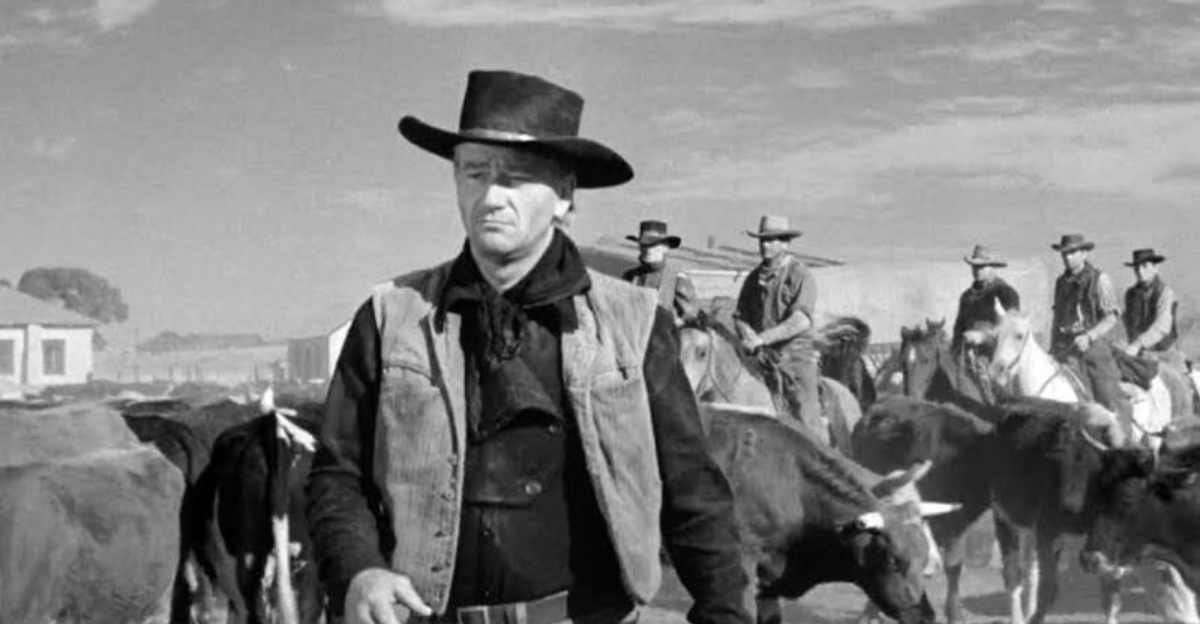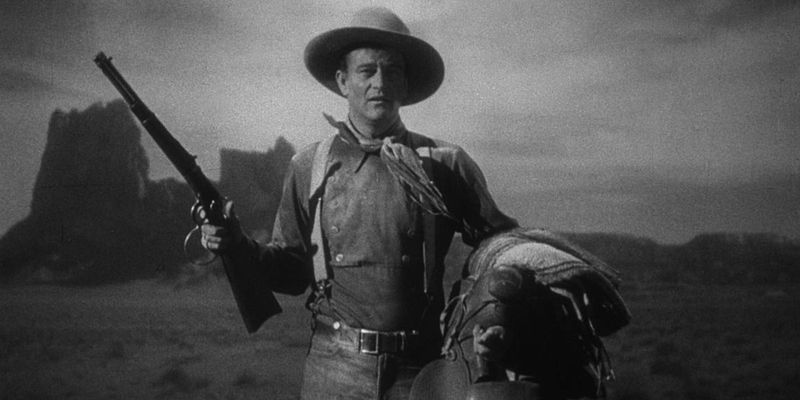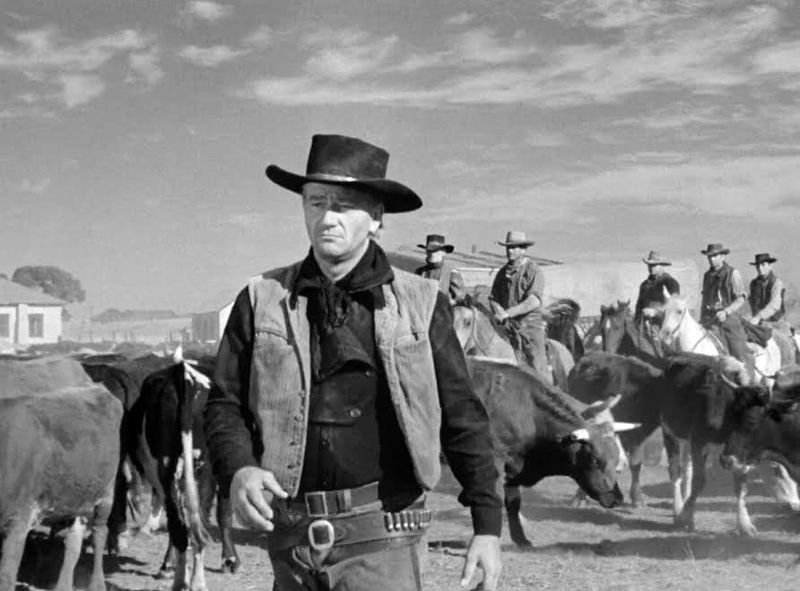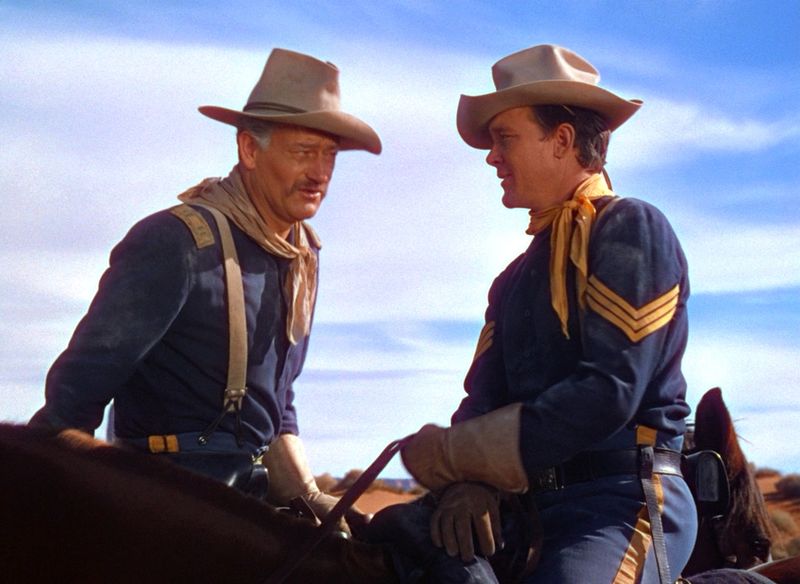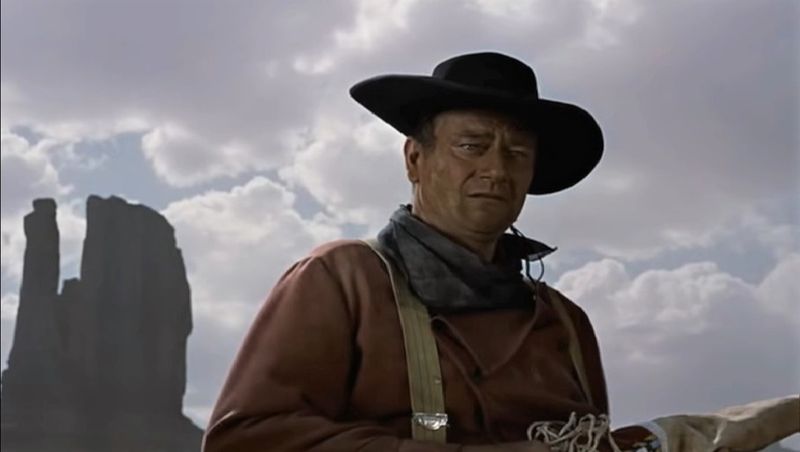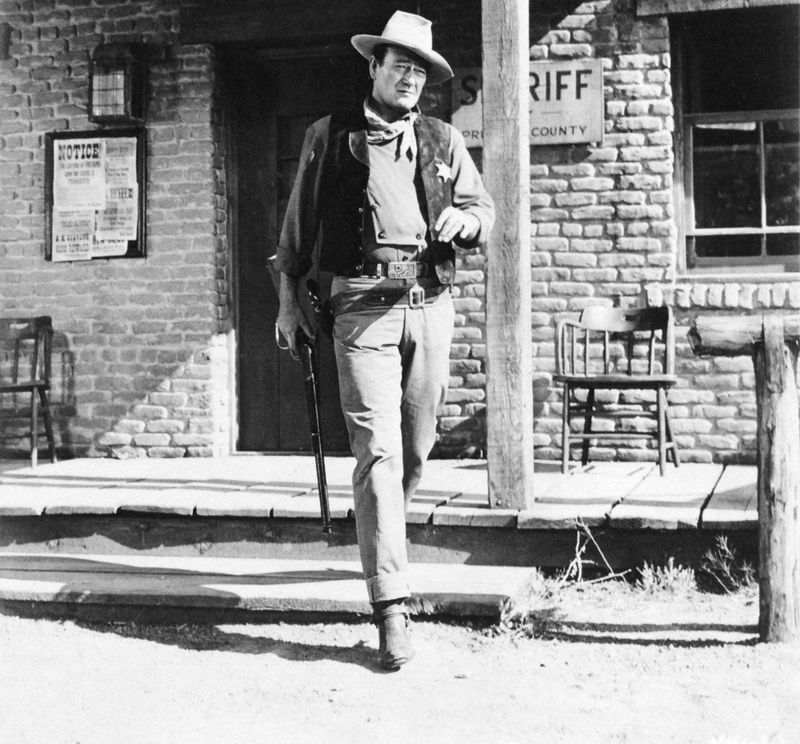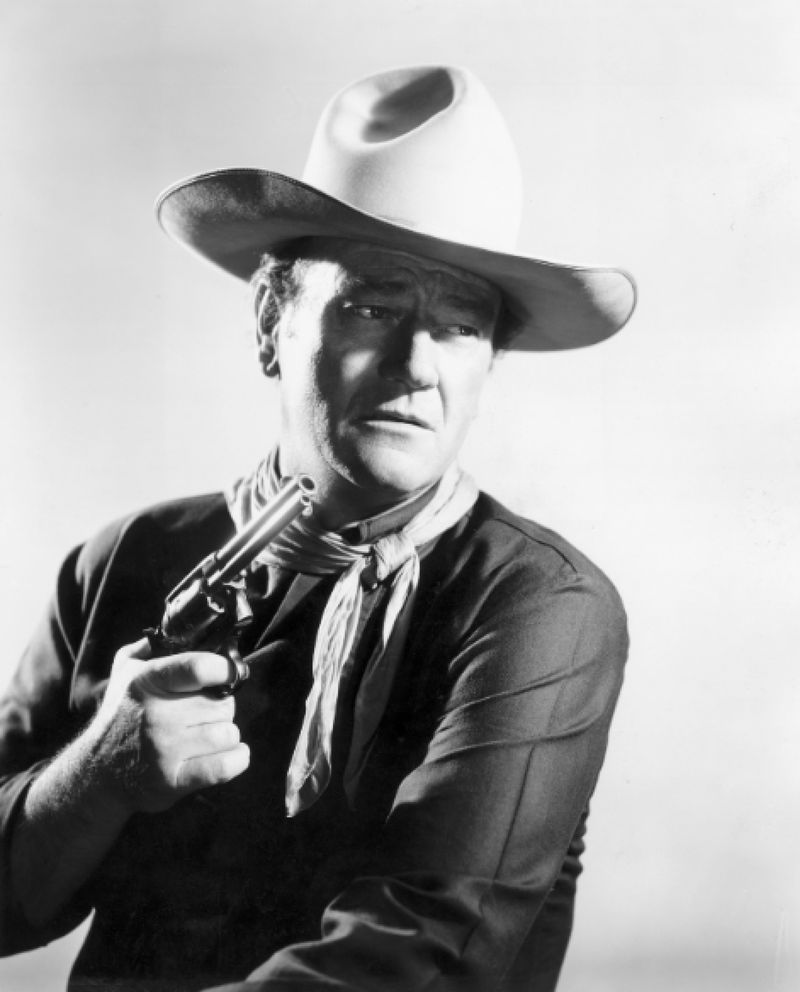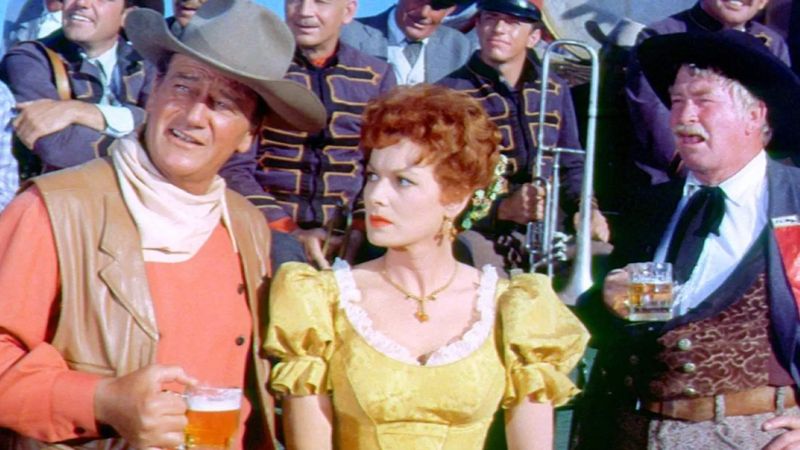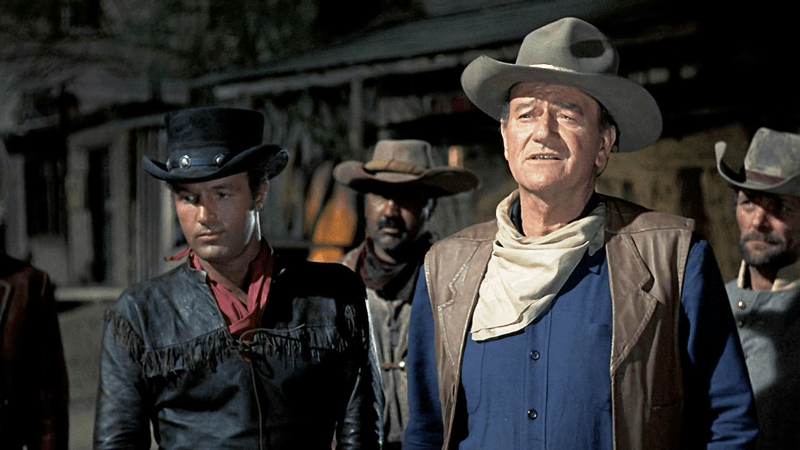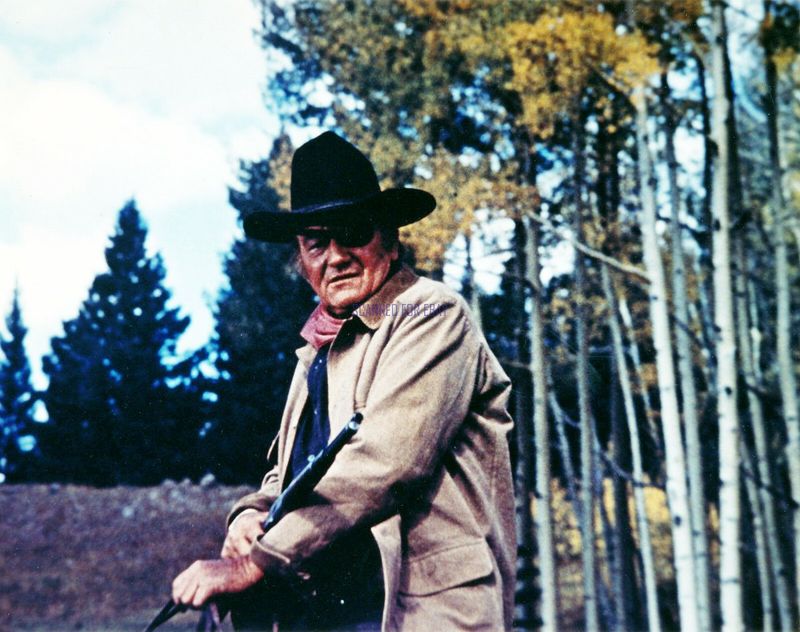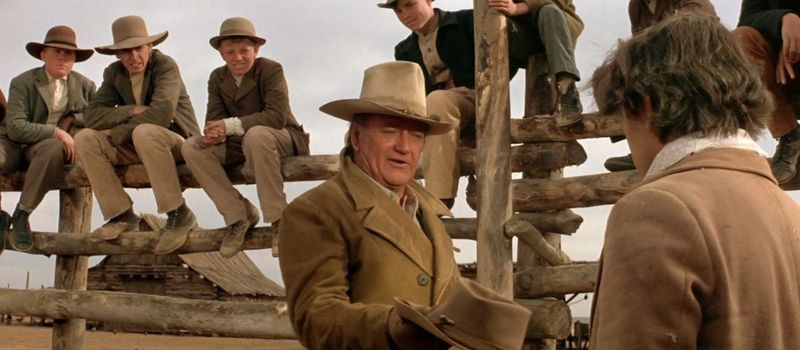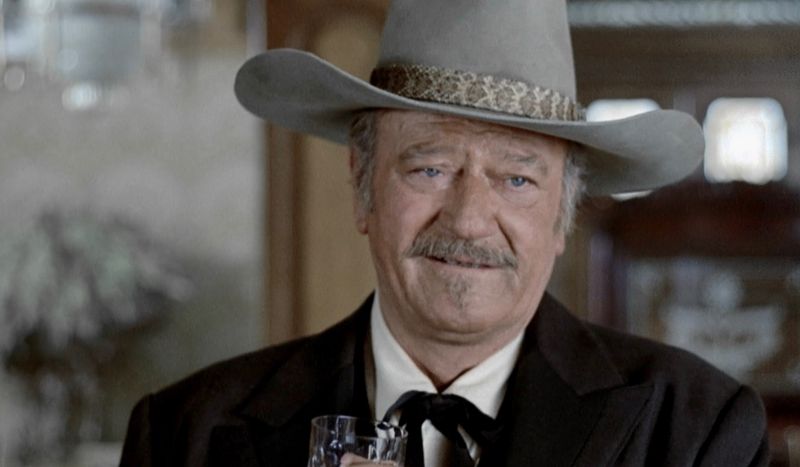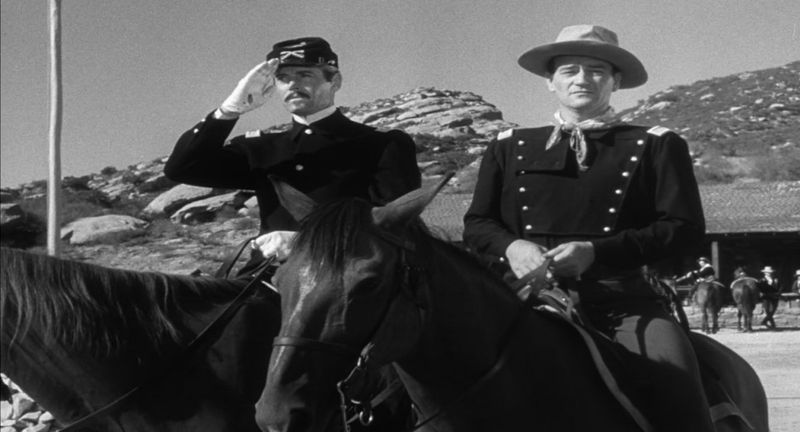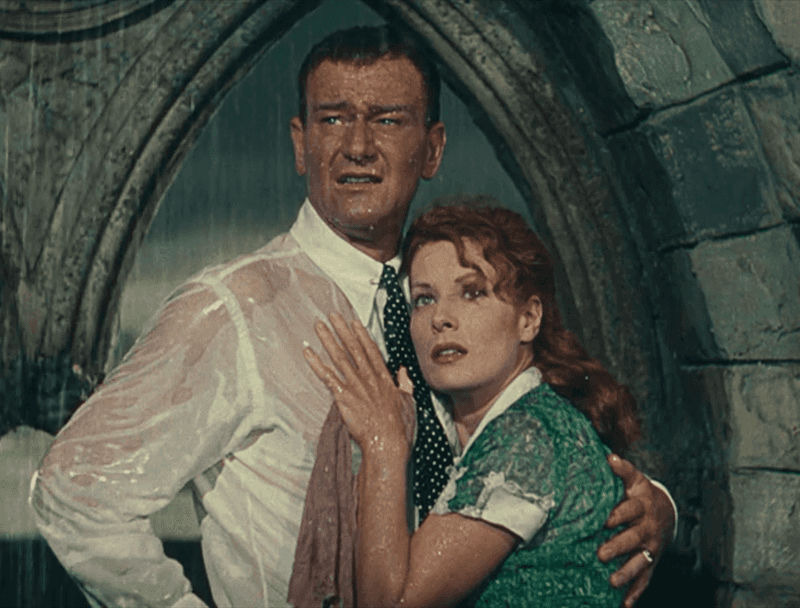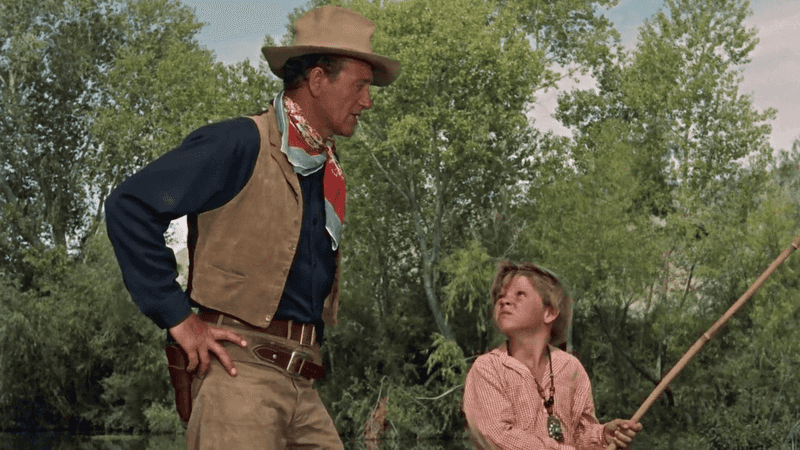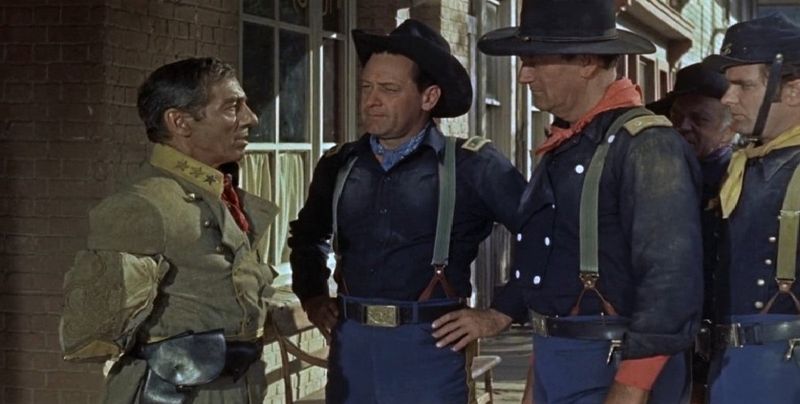Few actors embody the spirit of the American West like John Wayne. Standing tall with his iconic drawl and unwavering sense of justice, ‘The Duke’ became the ultimate symbol of cowboy heroism through dozens of unforgettable Western films.
From dusty shootouts to epic frontier tales, Wayne’s presence commanded the screen for over five decades, creating a legacy that defined the Western genre for generations.
1. Stagecoach (1939) – The Breakthrough Performance
Before this film, Wayne struggled in B-movies. Director John Ford cast him as the Ringo Kid, introducing Wayne with one of cinema’s most memorable shots – a dramatic zoom as he twirls his rifle.
The film’s success catapulted Wayne to stardom, establishing his persona as the tough-but-fair frontier hero. His portrayal combined physical presence with surprising emotional depth, creating the template for the Wayne character audiences would love for decades.
2. Red River (1948) – The Ruthless Cattle Driver
Wayne shocked viewers by playing against type as Thomas Dunson, a cattle driver whose obsession turns him tyrannical. Director Howard Hawks captured Wayne’s transformation from determined pioneer to borderline villain with chilling effectiveness.
The showdown between Wayne and Montgomery Clift remains a masterclass in tension. Film critic Pauline Kael famously noted Wayne’s performance showed he wasn’t just a star but a genuine actor with remarkable range.
3. She Wore a Yellow Ribbon (1949) – The Aging Officer
At just 42, Wayne convincingly portrayed Captain Nathan Brittles, a cavalry officer facing retirement. His nuanced performance captured the poignancy of a man confronting the end of his career and uncertain future.
Wayne’s subtle portrayal – the measured walk, weathered face, and quiet dignity – demonstrated remarkable maturity. Shot in stunning Technicolor in Monument Valley, Ford’s direction and Wayne’s performance created an elegiac portrait of the Old West’s fading era.
4. The Searchers (1956) – The Obsessed Avenger
Wayne’s portrayal of Ethan Edwards – a Civil War veteran consumed by hatred and revenge – represents his most complex role. His five-year search for his niece, captured by Comanches, reveals the dark underbelly of frontier mythology.
The final doorway scene, where Ethan stands isolated from family and civilization, remains one of cinema’s most powerful images. This John Ford masterpiece showcases Wayne at his most morally ambiguous, challenging the very heroism he typically embodied.
5. Rio Bravo (1959) – The Steadfast Sheriff
Sheriff John T. Chance refuses help from unreliable townsfolk when facing down a powerful rancher’s gang. Wayne’s performance as the stubborn lawman established his late-career persona – the professional who stands his ground regardless of odds.
Director Howard Hawks crafted a perfect showcase for Wayne’s authoritative presence. The chemistry between Wayne and Dean Martin (as the alcoholic deputy) added surprising emotional depth. Many consider this the definitive Wayne Western, blending action, humor, and friendship.
6. The Man Who Shot Liberty Valance (1962) – The Unsung Hero
Tom Doniphon secretly saves Jimmy Stewart’s eastern lawyer from the vicious outlaw Liberty Valance, then steps aside to let another man take credit. Wayne’s understated performance reveals a man who understands heroism isn’t about recognition.
Ford’s elegiac film explores how the West was won not just through gunfights but through sacrifice and compromise. Wayne’s portrayal of the tough rancher who loves silently and gives up everything represents a profound meditation on the true nature of heroism.
7. McLintock! (1963) – The Comedic Cattle Baron
Wayne revealed his surprising comedic timing in this loosely-based retelling of Shakespeare’s “The Taming of the Shrew.” As wealthy rancher G.W. McLintock, he battles with his estranged wife (Maureen O’Hara) in a series of increasingly hilarious confrontations.
The famous mud fight and spanking scenes (controversial by modern standards) showcase Wayne’s willingness to appear undignified for laughs. This lighter side of The Duke proved he could handle comedy while maintaining his commanding screen presence.
8. El Dorado (1966) – The Vulnerable Gunfighter
Cole Thornton teams up with an alcoholic sheriff (Robert Mitchum) to protect a family from ruthless hired guns. Wayne’s physical vulnerability – his character suffers from a bullet near his spine causing periodic paralysis – added a new dimension to his heroic persona.
Director Howard Hawks essentially remade his earlier Rio Bravo, but with darker undertones. Wayne’s willingness to show weakness while maintaining his heroic stature demonstrated his evolution as an actor. The friendship between Wayne and Mitchum’s characters provides the emotional core.
9. True Grit (1969) – The One-Eyed Marshal
Wayne finally won his Oscar playing Rooster Cogburn, the boozy, one-eyed marshal hired by a determined young girl to track her father’s killer. His performance balanced gruff humor with unexpected tenderness, creating his most beloved character.
The famous scene where Cogburn charges enemies with reins in teeth and guns blazing exemplifies Wayne’s larger-than-life heroism. Despite being 61 and battling health issues, Wayne’s physical commitment remained impressive. His chemistry with Kim Darby created one of cinema’s most unexpected and touching partnerships.
10. The Cowboys (1972) – The Aging Mentor
Faced with a cattle drive and no adult help, rancher Wil Andersen reluctantly hires schoolboys as drovers. Wayne’s performance as the stern but fair mentor who transforms boys into men ranks among his finest late-career work.
The shocking mid-film twist still leaves audiences gasping. Director Mark Rydell captured Wayne’s ability to convey wisdom and authority while showing genuine affection for his young charges. The film’s exploration of masculinity and responsibility feels quintessentially Wayne-esque.
11. The Shootist (1976) – The Dying Gunfighter
Wayne’s final film role proved hauntingly appropriate – a legendary gunfighter dying of cancer, seeking a dignified end. Given Wayne’s own battles with cancer, J.B. Books’ journey carries profound resonance.
Director Don Siegel captured the melancholy beauty of a man confronting mortality while staying true to his principles. The stellar supporting cast (including James Stewart and Lauren Bacall) honored Wayne’s legacy. His final shootout sequence serves as the perfect cinematic farewell to Hollywood’s greatest Western star.
12. Fort Apache (1948) – The Honorable Captain
Captain Kirby York respects the Native Americans while serving under a glory-seeking commander who leads troops to disaster. Wayne’s understated performance contrasts brilliantly with Henry Fonda’s rigid Lt. Colonel Thursday.
The first of Ford’s celebrated “Cavalry Trilogy” established Wayne as a thinking man’s action hero. His character’s final act – preserving the reputation of the foolish commander who got his men killed – demonstrates a complex understanding of duty, honor, and historical truth that transcends simple heroics.
13. The Quiet Man (1952) – The Irish-American Boxer
While not technically a Western, this John Ford classic showcases Wayne’s versatility as Sean Thornton, a former boxer returning to his Irish homeland. His tender romance with Maureen O’Hara reveals Wayne’s rarely-seen romantic side.
The film’s famous extended fistfight demonstrates Wayne could bring his physical presence to any genre. The genuine chemistry between Wayne and O’Hara (in their most beloved pairing) proved The Duke could conquer hearts as effectively as he conquered the West.
14. Hondo (1953) – The Half-Indian Scout
Cavalry scout Hondo Lane, who lived with Apaches and respects their ways, protects a woman and her son living in dangerous territory. Originally filmed in 3D, this underrated gem showcases Wayne’s physical presence and quiet authority.
Based on a Louis L’Amour story, the film explores Wayne’s character’s mixed heritage and divided loyalties. His chemistry with Geraldine Page earned her an Oscar nomination. Wayne’s performance as a man caught between two worlds demonstrated his ability to convey complex emotions beneath his stoic exterior.
15. The Horse Soldiers (1959) – The Union Colonel
Based on a true Civil War incident, Colonel John Marlowe leads a cavalry raid deep into Confederate territory. Wayne’s portrayal of the conflicted Union officer who despises doctors (due to his wife’s death) yet must work with one captures the personal costs of war.
Director John Ford crafted a realistic cavalry adventure that avoids simple heroics. The sequence featuring the charge of Confederate cadets (based on a historical event) remains unforgettable. Wayne’s chemistry with William Holden (as the surgeon) creates compelling dramatic tension throughout.
